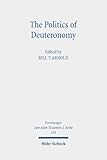The politics of Deuteronomy / edited by Bill T. Arnold ; with the assistance of Harald Samuel.
Series: Forschungen zum Alten Testament. 2. Reihe ; 156Publisher: Tübingen : Mohr Siebeck, [2025]Description: viii, 286 pages ; 24 cmContent type:- text
- unmediated
- volume
- 9783161639098
- 306.2
| Item type | Current library | Shelving location | Call number | Materials specified | Status | Notes | Barcode | |
|---|---|---|---|---|---|---|---|---|
 BOOKs
BOOKs
|
National Law School | General Stacks | 306.2 ARN (Browse shelf(Opens below)) | PB | Available | Recommended by Mr. Sidharth Chauhan | 40295 |
Includes bibliographical references and index.
Preface
Bill T. Arnold — Introduction: Political Theory and Interpretive Possibilities in Deut 16:18–18:22
Part I The Book of Deuteronomy in Political Theory:
Francis Borchardt — Judge, King, Priest, Prophet: The Invention of Authority in Deut 16:18–18:22;
Madhavi Nevader — Reading Politics and the Politics of Reading: Deuteronomy as Test Case;
Brent A. Strawn — Once Again on Deuteronomic ‘Constitutionalism’: Revision, Amendment, and the Practice(s) of Reading;
Anselm C. Hagedorn — Judges Between Sovereignty of Law and Limitations of Justice: Deut 16:18–20 in its Mediterranean Context;
Carmen Palmer — Reframing Deuteronomy’s Law of the King Through the Lens of Israelite Identity
Part II The So-Called Constitutional Passage: Deut 16:18–18:22:;
Bruce Wells — Political and Administrative Ideals in Deuteronomy and Sixth-Century Babylonia
Bill T. Arnold — Deuteronomy’s Justice Manifesto: The Significance of ‘Correct Decision(s)’ in Deut 16:18;
Reinhard Müller — Instructions on Judiciary: A Fundamental Section of Urdeuteronomium (Deut 16:18–20*; 17:8–13*);
Kevin Mattison — Deuteronomy’s Law of the King (Deut 17:14–20) as an Ancient Emoluments Clause: Protecting the King’s Powers Against Corruption;
Sandra Jacobs — Burning Children? Deuteronomy and its Hermeneutic of Dissent;
List of Contributors;
Index of Sources;
Index of Names;
Index of Subjects.
The Book of Deuteronomy contains a text of compelling relevance at its center - the so-called Law of Offices (Deut 16:18-18:22). Scholars have investigated this passage as an early type of constitutional law, especially for its definition of the responsibilities of four human authorities in ancient Israel: judges, kings, priests, and prophets. Indeed, this portrait of Israel's human leaders continues to fascinate us with possibilities, perhaps especially because of its enduring significance for political theorists and legal scholars even today. This volume presents contributions stemming in part from sessions of the Deuteronomy Program Unit of the Society of Biblical Literature. Leading experts in the field offer innovative essays on the passage. The essays are not directly related to each other, yet they share a common goal: investigating this important portion of Deuteronomy from either a theoretical or exegetical perspective.
There are no comments on this title.
